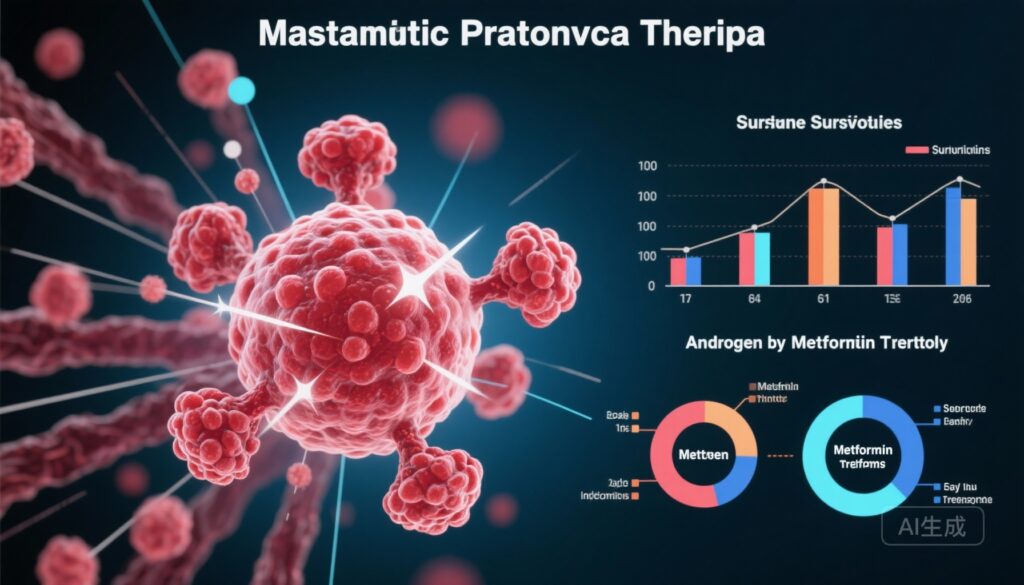Highlights
- The large, randomized STAMPEDE platform trial found no significant overall survival benefit with adding metformin to standard ADT-based therapy in metastatic hormone-sensitive prostate cancer (mHSPC).
- Metformin consistently demonstrated mitigation of adverse metabolic effects associated with ADT, including reductions in body weight, waist circumference, and glycemic markers in various trials.
- Early-phase and smaller trials suggest possible improvements in progression parameters like castration-resistant prostate cancer-free survival (CRPC-FS), particularly in low-volume metastatic disease, but these findings require further validation.
- Metformin’s safety profile in prostate cancer patients undergoing ADT is favorable with expected gastrointestinal adverse events, mainly diarrhea; no significant increase in severe toxicities was observed.
Background
Prostate cancer remains a leading malignancy worldwide, with metastatic hormone-sensitive prostate cancer (mHSPC) representing a critical therapeutic challenge. Androgen deprivation therapy (ADT) is standard frontline treatment but is associated with significant adverse metabolic sequelae—weight gain, insulin resistance, and increased cardiovascular risk—that impair patient health and quality of life. Concurrently, metformin, a widely used antidiabetic agent, has attracted interest for potential anticancer properties via mechanisms including AMPK activation and mTOR inhibition. Observational studies have suggested a possible benefit of metformin in reducing cancer incidence and improving prognosis in various malignancies, including prostate cancer.
Several trials have hence investigated whether metformin could augment the efficacy of ADT either by direct antitumor effects or by reducing ADT-related metabolic harms. This review focuses on the latest evidence, especially the definitive STAMPEDE phase 3 trial results, alongside contemporaneous studies examining metformin’s impact in this clinical setting.
Key Content
Chronological Development of Clinical Evidence
Early Evidence and Pilot Studies (2010-2017): Initial phase II and pilot studies, such as the randomized trial by Spry et al. (2012) and a Shanghai cohort (2017), explored metformin with lifestyle interventions in ADT-treated patients. These small trials reported improvements in anthropometric and metabolic parameters (weight, waist circumference) with metformin compared to controls, though biochemical markers showed variable results. Gastrointestinal tolerability was acceptable with mild diarrhea as the main side effect.
Phase II Trials and Metabolic Outcomes (2020-2023): Subsequent phase II RCTs examined metformin’s role in preventing metabolic syndrome (MS) linked to ADT. For instance, a 2025 PRIME study (NCT) enrolling normoglycemic prostate cancer patients initiating ADT reported no significant reduction in metabolic syndrome incidence with metformin but demonstrated meaningful improvements in body weight, waist circumference, and HbA1c levels at 9-18 months. Similar trials assessing fat distribution, lipid profiles, and insulin resistance corroborated these metabolic benefits, though sustained impact remained uncertain.
Metastatic Prostate Cancer Focused Trials: The MANSMED phase II RCT (2021) in locally advanced or metastatic hormone-sensitive prostate cancer (mHSPC) found significantly prolonged castration-resistant prostate cancer-free survival (CRPC-FS) with metformin plus standard care versus standard care alone, particularly in patients with low metastatic tumor burden. Overall survival was not significantly improved. This suggested potential antitumor synergy with ADT, meriting larger confirmatory trials.
The STAMPEDE Phase 3 Trial (2025): Definitive Evidence on Survival and Safety
The STAMPEDE trial is a multi-arm, multi-stage platform protocol assessing novel agents in prostate cancer. Its recent phase 3 substudy randomized 1874 non-diabetic patients with metastatic prostate adenocarcinoma (primarily newly diagnosed mHSPC) to standard of care (ADT ± docetaxel, androgen receptor pathway inhibitors [ARPIs], radiotherapy) versus standard care plus metformin (850 mg twice daily). The population was carefully stratified and followed for a median of 60 months.
The primary endpoint of overall survival (OS) showed no statistically significant benefit from metformin addition (median OS 67.4 vs. 61.8 months; hazard ratio [HR] 0.91; 95% CI 0.80-1.03; p=0.15). Grade 3 or higher adverse events were slightly more frequent in the metformin arm, primarily gastrointestinal (diarrhea), but drug-related mortality was lower (1 vs 6 deaths). Importantly, metformin use significantly reduced adverse metabolic side-effects of ADT, confirming benefits observed in smaller studies.
This large, rigorously conducted trial provides high-level evidence that metformin should not be added routinely to standard systemic therapy for metastatic hormone-sensitive prostate cancer for the purpose of extending survival, although metabolic advantage may warrant consideration in select clinical scenarios.
Metformin’s Impact on Metastasis-Free Survival and Progression
Post-hoc exploratory analyses from other trials, such as the SPARTAN trial in nmCRPC patients, revealed that metformin exposure correlated with improved metastasis-free survival (MFS). However, these analyses remain hypothesis-generating due to lack of randomization for metformin use and possible confounders.
Safety Profile and Tolerability
Across multiple studies, including STAMPEDE and radiotherapy plus ADT trials, metformin was well tolerated. The main side effect was grade 1-2 diarrhea, with rare severe gastrointestinal events. No increased genitourinary toxicities or unexpected severe adverse events were reported. Metabolic and anthropometric outcomes improved without compromising quality of life.
Expert Commentary
Metformin’s mixed evidence in prostate cancer reflects its complex biology and the challenges of repurposing an antidiabetic agent as an anticancer therapy. Mechanistically, metformin activates AMP-activated protein kinase (AMPK), inhibiting mTOR pathways pivotal in cancer cell proliferation and survival. It also modulates insulin and glucose metabolism, which may influence tumor microenvironment and progression.
Despite promising preclinical and early clinical signals, the STAMPEDE trial’s failure to demonstrate an OS benefit in metastatic hormone-sensitive prostate cancer tempers enthusiasm for metformin as a survival-enhancing adjunct. However, the consistent metabolic benefits hold clinical importance given cardiovascular risk in this population.
The lack of survival benefit may result from heterogeneous tumor biology, optimal disease stage for intervention, and interplay with concomitant therapies such as docetaxel and ARPIs. Notably, subgroup analyses in smaller trials suggest low-volume metastatic disease might derive more oncologic benefit, requiring further prospective evaluation.
Guidelines currently do not recommend routine metformin use solely for prostate cancer treatment outside diabetes indications. Future research should focus on identifying molecular or clinical biomarkers predicting metformin sensitivity, integration with novel agents, and careful metabolic monitoring.
Conclusion
The STAMPEDE phase 3 trial provides definitive, high-quality evidence that adding metformin to standard of care in metastatic hormone-sensitive prostate cancer does not significantly improve overall survival. Nonetheless, metformin mitigates adverse metabolic effects of ADT, such as weight gain and insulin resistance, supporting its role in managing therapy-related complications.
Emerging data suggest potential benefits in specific subgroups and progression metrics warrant further research. Clinicians should balance metformin’s metabolic advantages against the lack of survival improvement when considering its use in this setting.
Further randomized controlled trials focusing on metformin’s antitumor activity, optimal dosing, and combination strategies, as well as mechanistic studies, are needed to clarify its role in prostate cancer management.
References
- Gillessen S, Murphy L, James ND, et al; STAMPEDE investigators. Metformin for patients with metastatic prostate cancer starting androgen deprivation therapy: a randomized phase 3 trial of the STAMPEDE platform protocol. Lancet Oncol. 2025 Aug;26(8):1018-1030. doi: 10.1016/S1470-2045(25)00231-1. PMID: 40639383; PMCID: PMC12303861.
- Harshman LC, Albiges L, et al. A Randomized Phase 3 Trial of Metformin in Patients Initiating Androgen Deprivation Therapy as Prevention and Intervention of Metabolic Syndrome: The PRIME Study. J Urol. 2025 Nov;214(5):496-508. doi: 10.1097/JU.0000000000004695. PMID: 40711960.
- Beyoun N, et al. Repurposing metformin as anticancer drug: Randomized controlled trial in advanced prostate cancer (MANSMED). Urol Oncol. 2021 Dec;39(12):831.e1-831.e10. doi: 10.1016/j.urolonc.2021.05.020. PMID: 34167872.
- Kerr LA, Sweeney C, et al. Metformin for Prevention of Anthropometric and Metabolic Complications of Androgen Deprivation Therapy in Prostate Cancer Patients Receiving Radical Radiotherapy: A Phase II Randomized Controlled Trial. Int J Radiat Oncol Biol Phys. 2023 Feb 1;115(2):317-326. doi: 10.1016/j.ijrobp.2022.07.035. PMID: 35907513.
- Smith MR, et al. A prospective, randomized pilot study evaluating the effects of metformin and lifestyle intervention on patients with prostate cancer receiving androgen deprivation therapy. BJU Int. 2012 May;109(10):1495-502. doi: 10.1111/j.1464-410X.2011.10555.x. PMID: 21933330.
- Khawaja Z, et al. Effect of concomitant medications on treatment response and survival in non-metastatic castrate resistant prostate cancer: Exploratory analysis of the SPARTAN trial. Eur J Cancer. 2024 Nov;211:114197. doi: 10.1016/j.ejca.2024.114197. PMID: 39243730.




The STAMPEDE metformin trial provides important null results that challenge earlier observational enthusiasm for metformin in prostate cancer. While no overall survival benefit was observed, the metabolic side-effect mitigation (improved weight, waist, and HbA1c) documented in the contemporary PRIME trial adds nuance to the clinical picture.
Clinical Utility: Moderate. The lack of cancer-specific benefit means metformin shouldn’t be prescribed primarily as an anti-cancer agent in mHS prostate cancer. However, the metabolic benefits during ADT are clinically relevant and evidence-based.
Would I use this clinically? YES, but with appropriately limited expectations:
1) For patients with pre-diabetes or metabolic syndrome starting ADT, metformin is a reasonable intervention to mitigate treatment-related metabolic complications
2) I would NOT recommend metformin to cancer patients as an anticancer therapy based on this evidence
3) The decision should be individualized based on metabolic risk factors and diabetes prevention goals
The study’s strength is its pragmatic design and integration with other ADT trials. The limitation is that contemporary systemic therapies (docetaxel, abiraterone) have changed the treatment landscape since trial design. The modest metabolic benefits justify selective use, but claims of cancer efficacy are not supported. This represents good science that appropriately reins in earlier speculative enthusiasm.